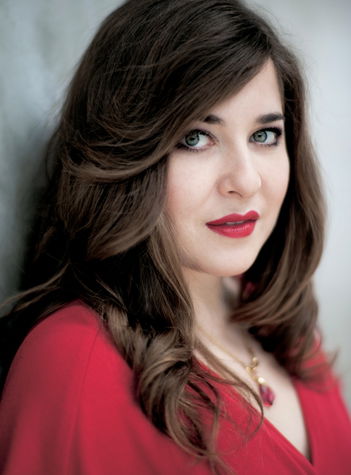Programme
Alisa Weilerstein
Fragments
Secure your seat for the 2025/2026 season – presales are open.
Choose SubscriptionAlisa Weilerstein is a familiar name to Philharmonic audiences, celebrated for her extraordinary artistry on the cello. This season, however, she reveals a new dimension of her creativity with an excerpt from her Fragments project—two thoughtfully conceived multimedia cycles that weave together Bach’s legendary cello suites with newly commissioned works by contemporary composers, written specifically for her.
Subscription series R | Czech Chamber Music Society
Alisa Weilerstein
Fragments
Alisa Weilerstein cello

Alisa Weilerstein cello

A box of rice cereal served as Alisa Weilerstein’s very first cello when she was two and a half years old. Little Alisa caught the chickenpox just when her musical parents (her mother is a pianist and her father is a violinist) were on a world tour, so her grandmother was coming up with fun ideas. The biggest hit was a set of musical instruments made with breakfast cereal boxes, but Alice was only interested in the cello. Unfortunately, that cello could not be played. Two years later, little Alisa’s parents finally let her persuade them to get her a real instrument. Six months later, she played it in public for the first time. At age 13 she played with the Cleveland Orchestra, and Carnegie Hall opened its doors to her for the first time when she reached age 15. She did not, however, allow musical institutions to limit her to a one-sided musical orientation, so after graduating from the Youth Artist Program at the Cleveland Institute of Music, she went to Columbia University to study Russian history (both of her parents have Russian roots). Nonetheless, her study plan included several hours of daily practice on the cello, and at the same time she had a busy schedule of concerts!
This American cellist’s popularity led to a concert appearance at the White House, where she was received by the president’s family in 2008, and her artistic prestige earned her a fellowship from the MacArthur Foundation (2011) and an award from BBC Music Magazine for the “Recording of the Year 2013” (cello concertos by Edward Elgar and Elliott Carter with Daniel Barenboim and the Staatskapelle Berlin). At the time, she was already routinely giving concerts with top orchestras in the USA, Europe, and Asia. She also continues to give solo recitals, earning acclaim especially for her interpretations of Johann Sebastian Bach’s Six Suites for Solo Cello. She has also recorded the whole cycle on CD (nominated for a prize from the journal Gramophone), and during the pandemic she made live recordings at home for a project titled 36 Days of Bach (one movement from a suite every day). Because she is also a major proponent of contemporary music, she also created a multimedia project titled Fragments, which combines the aforementioned Bach suite movements with 27 newly composed pieces. All of this was done with the famed theatrical and operatic stage director Elkhanah Pulitzer supervising visual aspects of the project, which sets out to “find new ways to connect the audience and artist”. The project has already been heard at such venues as Carnegie Hall and the Kennedy Center in Washington, D.C.
That, however, is not the end of her service to today’s cello literature: contemporary composers are writing more works for her with solo concertos by Joan Tower, Matthias Pintscher, Pascal Dusapin, and Richard Blackford at the forefront. It is the premiere of Blackford’s concerto that awaits us at today’s concert under the baton of Tomáš Netopil. Weilerstein’s long-term collaboration with the Czech Philharmonic dates back to 2013 at the Dvořák Prague Festival, when she played Dvořák’s Cello Concerto. A year later, the concerto’s release on CD received great acclaim from critics. “In Bělohlávek and the Czech Philharmonic, [Weilerstein] has chosen ideal partners”, commented Hugh Cunning in The Sunday Times. Weilerstein also has only the fondest memories of working with the Czech Philharmonic: “I really, really love the sound of the orchestra—there is a kind of lyricism and tenderness, which I don’t often hear in Dvořák playing.” This is perhaps why Weilerstein has come to Prague several more times and even performed with the Czech Philharmonic at Carnegie Hall on tour in 2018. Her younger brother, the conductor Joshua Weilerstein, and her husband, the Venezuelan conductor Rafael Payare, have also appeared with the orchestra at the Rudolfinum.
Alisa Weilerstein is a familiar name to Philharmonic audiences, celebrated for her extraordinary artistry on the cello. This season, however, she reveals a new dimension of her creativity with an excerpt from her Fragments project—two thoughtfully conceived multimedia cycles that weave together Bach’s legendary cello suites with newly commissioned works by contemporary composers, written specifically for her.